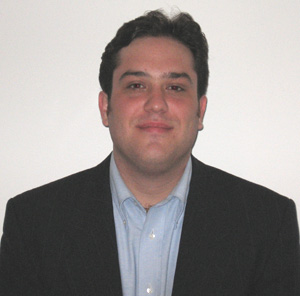JESSE OF JAZEERA: JESSE MESNER-HAGE '05 WORKS FOR THE ARAB NEWS SERVICE

Details
As an English major, Jesse Mesner-Hage, from Montpelier, Vt., was spending his junior year away from Haverford in Egypt, studying colloquial Arabic, not sure what he was going to do with it, but certainly thinking of writing, producing, or directing:“That's when I first saw the gorgeous Al-Jazeera logo on television, and noticed the reverence people in the street had for it—a news service that told the truth as the Arabs saw it.” Mesner-Hage remembers patrons in cafes or shoppers looking at TV in appliance stores, seeming almost reverential. Because despite Defense Secretary Donald Rumsfeld's and U.S. military brass denouncements of Al-Jazeera broadcasts, they were not anti-American, simply objective. If allied bombing missions killed Iraqi civilians, Jazeera showed the bodies, as opposed to the increasingly timid CNN, or the shrinking major networks' coverage (American reporters and cameramen were being killed and injured, too, by roadside bombs, but there was no corresponding push to report that the Iraq war was being lost).
Al-Jazeera and the somewhat less-trusted Al Arabia news service from Saudi Arabia (because the House of Saud's double-deals with the Americans often alienate other Arabs), are seen as the two most penetrating news sources in the Mid-East. Jazeera, at least, seems genuinely fired by old-fashioned news-for-news' sake motives. Originally the creature of the BBC and the Saudi Royal Family (1995), it quickly collapsed for being too independent and uncontrollable, reporting on bizarre Saudi state-beheading practices (of recalcitrant thieves or adulterous wives, for example), by actually televising one. BBC quickly pulled its financial plug, but by the next year the young, eccentric billionaire, Sheikh Hammad bin Khalifa Al Thani, the Emir of Qatar, had bankrolled the whole enterprise, and Al-Jazeera was outstripping everyone in the Mid-East in thorough coverage. When the Iraq war broke out in 2003, Al Thani's reporters and producers suffused the story, supplying context for the American military's and civilian support teams' actions—the“Weapons of Mass Destruction” and biological weapons rationales, for instance. The State Department and White House got daily thumpings two years before the New York Times, Washington Post, CNN, NBC, ABC, and CBS weighed in with the“news” that WMDs and bios had largely been expedient casus belli rationales.
As a result, and because it was being favored as a media outlet for Bin Laden and Al Queda (filmed terrorist interview tapes were being released to it exclusively), Jazeera's Baghdad office was closed for a month in 2004, by the U.S.–backed Interim Iraq Government, and it had to rely on other services' friendly reporters, and work as best it could from outside the city. Al-Jazeera had also reported that there were 700 civilians killed in the brutal battle for Fallujah in April, 2004, and regularly broadcast true numbers of the American war dead–(2,563 currently)–something that caused then Secretary of State Colin Powell to call Jazeera“horrible and slanted,” and Donald Rumsfeld to brand its journalism“inexcusable.” Those numbers were not showing up elsewhere. ABC to this day lists American fatalities by name on its Web reports, but doesn't stress total KIA's frequently.
For a while, in the name of journalism verité, Jazeera came close to broadcasting atrocity journalism, but seems to have pulled back on the ghoulish cadaver shots favored by Arab news services like Al Manar from Lebanon. Al Iraqiya and Al Hurra, backed by the Americans, are much milder, like domestic war coverage within the U.S. Abu Ghraib prison coverage, a worldwide lead broadcast, wasn't mentioned on Hurra for three to four days. Lately, however, with anti-war sentiment rising at home, both Iraqia and Hurra showed extensive footage in which two Army specialists, one from Texas and the other from Oregon, were kidnapped by insurgents after having overrun their checkpoint, and tortured in ghastly ways that made identification difficult.
But just in terms of big business, the world media has settled on the Middle East as a prime place to report, and so beefed-up bureaus from Germany and the BBC are in the works, and all the original Arab media TV and radio services are thriving. And it is at just this point that Al-Jazeera decided to open an English-language Washington, D.C., bureau (Jazeera reports in the Mid-East and elsewhere in the world in Arabic, sometimes with a translated crawl at the bottom of the screen). When Jesse Mesner-Hage saw the announcements for the American bureau, around winter break of his senior year, he immediately applied for a job:“I didn't think about it for a minute being ‘controversial' or anything else. I think the misperceptions about Al-Jazeera are from sheer lack of information about it,” he says now. [He was notified he'd gotten the job just days before graduation.]“When people begin to see it [it's scheduled to begin operations in the fall], they'll be amazed at the fresh way in which news, opinion, sports, etc. can be presented. I'm not an official spokesman or anything, but I can generally say that our broadcasts will be free of the sound-bite culture people have come to associate with television reporting. We'll do longer takes where warranted. You'll see opinion unaffected by the administration's point of view…We'll also try to look at stories from the perspectives of our four main bureaus [in Doha (Qatar), Kuala Lumpur (Malaysia), London, and Washington, plus reports from throughout Latin America. It's very exciting, and I think it will be rejuvenating for other broadcast media.”
One thing Mesner-Hage particularly likes is the youth and diversity of the newsroom staff:“Looking around me I see a girl from the Ukraine, some West End Brits, a lot of Americans…don't want to repeat myself, but it's uplifting, hopeful, and very exciting, man.”
So far he's seeing Al-Jazeera from the ground up. He's had some opportunities to help with research, to edit, to assist with interviews, to nibble around the edges of producing:
“What? My friends and family? Entirely supportive. Everyone's been pretty cool.”
— John Lombardi



